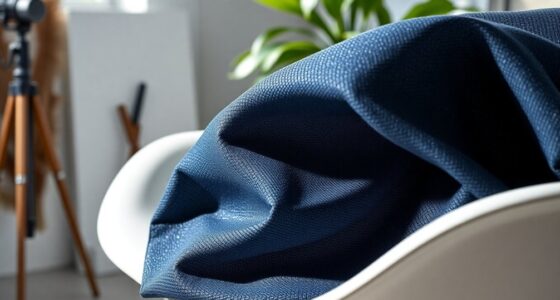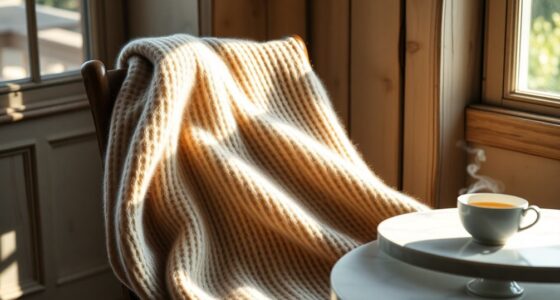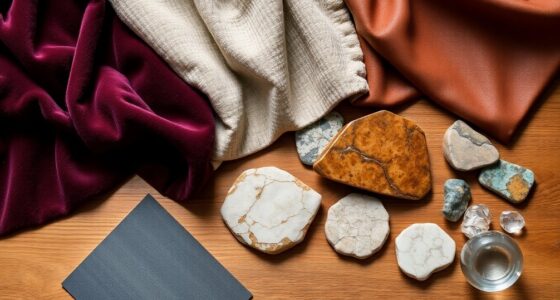Mercerized cotton is a game-changer for your wardrobe. It's treated with sodium hydroxide, enhancing its strength, luster, and color vibrancy. You'll notice that mercerized cotton is up to 25% stronger than regular cotton, making it more durable. Plus, it retains its shape better and resists shrinkage after washing. Ideal for high-quality clothing and crochet projects, this luxurious fabric is worth considering. Keep exploring to discover why it's the fabric upgrade you didn't know you needed!
Key Takeaways
- Mercerized cotton undergoes a chemical process that enhances its strength, luster, and dye absorption, making it a superior fabric choice.
- This type of cotton is up to 25% stronger than non-mercerized cotton, ensuring greater durability for garments.
- Mercerization reduces fabric shrinkage, helping garments retain their shape and fit even after washing.
- The smooth, silky texture of mercerized cotton provides a luxurious feel, ideal for high-end fashion and intricate crochet projects.
- Increased awareness of sustainable practices is driving demand for environmentally-friendly mercerized cotton options in the textile industry.
Understanding Mercerized Cotton
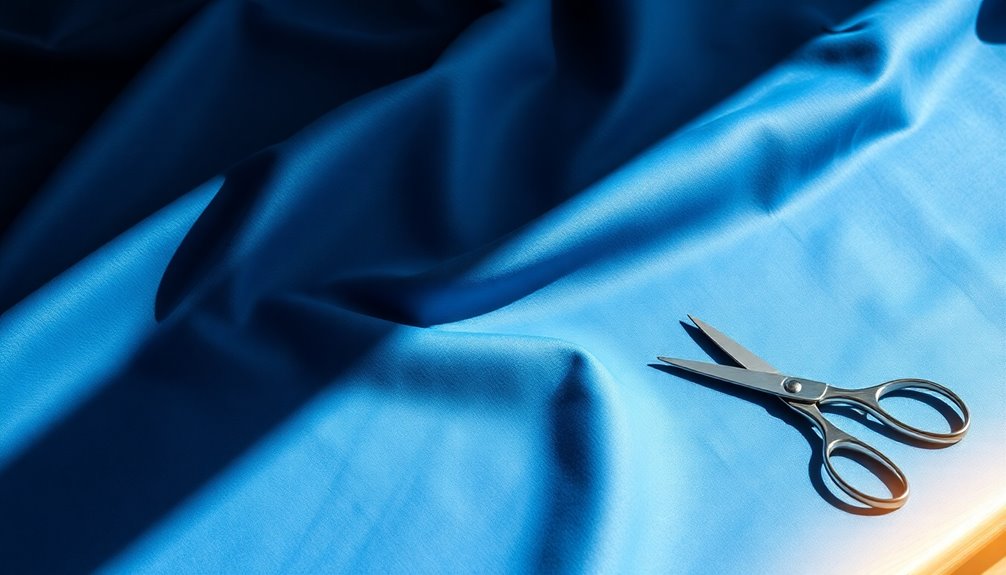
Mercerized cotton stands out in the textile world for its remarkable qualities. The mercerization process enhances cotton fibers by soaking them in a caustic sodium hydroxide solution. This treatment changes their structure from flat to cylindrical, which improves light reflection and gives it a beautiful shine.
You'll appreciate that mercerized cotton boasts increased tensile strength, making it up to 25% stronger and more durable than its non-mercerized counterpart. Plus, it allows for deeper, more vibrant dye uptake, ensuring colors remain intense even after multiple washes.
Another benefit is its reduced shrinkage during washing, helping garments maintain their shape and fit over time. Choosing mercerized cotton means opting for a high-quality textile that elevates your wardrobe.
The History of Mercerization
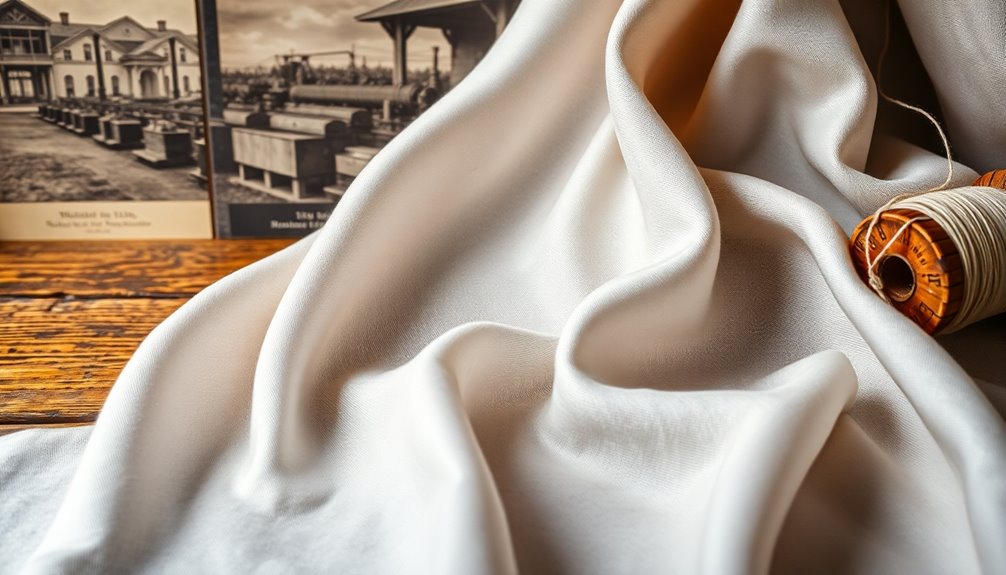
Although the mercerization process may be widely used today, its origins trace back to 1844 when British chemist John Mercer first discovered its potential.
He noticed that treating cotton fibers with caustic soda caused them to swell, resulting in stronger and more lustrous fabrics. This groundbreaking observation laid the foundation for a revolutionary technique in the textile industry.
In the late 19th century, Horace A. Lowe refined the process by applying tension to the fibers during treatment, which prevented shrinkage and further enhanced luster.
By the 1880s, mercerization was patented, transforming cotton production and enabling the creation of vibrant, durable fabrics.
Over time, this process has become a standard, greatly improving the quality and appeal of cotton products.
The Mercerization Process Explained
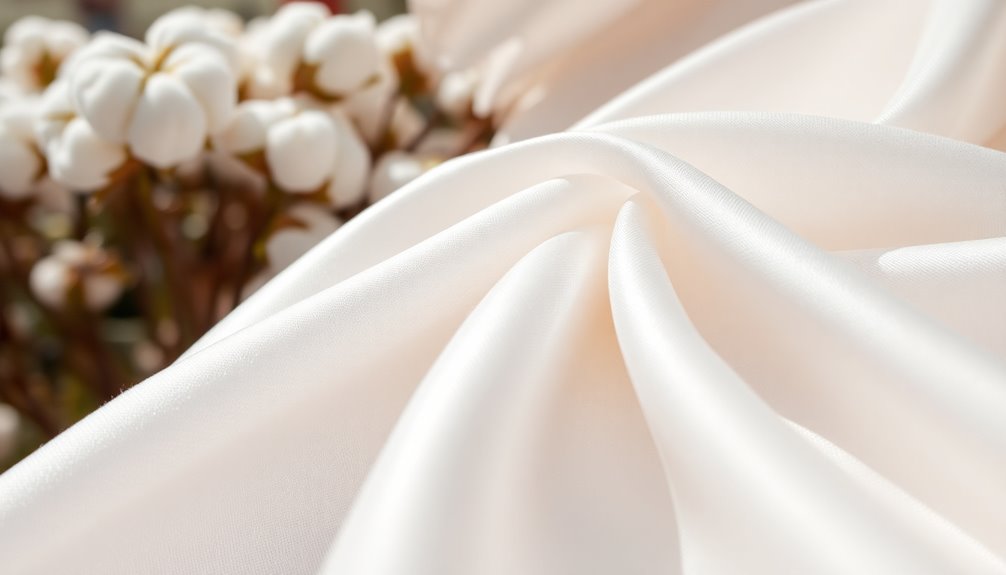
The mercerization process is a transformative technique that enhances cotton's natural qualities. It involves immersing cellulosic fibers—typically cotton—in a sodium hydroxide solution at a concentration of 20-30%. This causes the fibers to swell and change structure, improving their tensile strength and luster.
During treatment, tension is applied to maintain thread integrity while enhancing the fabric's shine. After the sodium hydroxide treatment, an acidic solution neutralizes the caustic soda, followed by thorough rinsing to eliminate any residual chemicals.
This three-step process not only increases the cotton's durability but also improves dye uptake, leading to more vibrant, long-lasting colors. Mercerization truly elevates cotton, transforming it into a high-quality textile that's both beautiful and strong.
Benefits of Mercerized Cotton
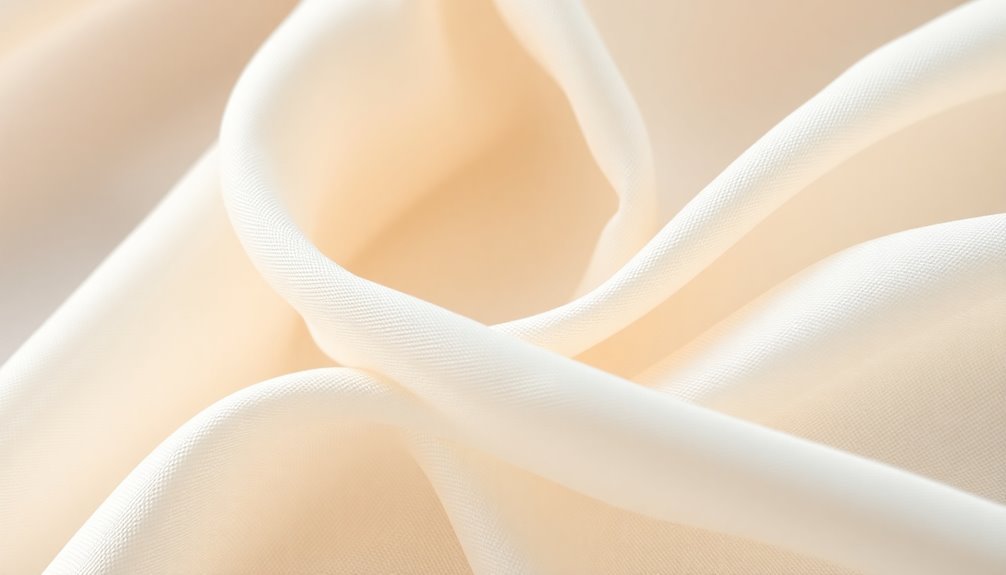
After undergoing the mercerization process, cotton fibers gain several remarkable benefits that enhance their appeal and functionality.
One of the standout benefits of mercerized cotton is its ability to absorb dye more effectively, resulting in deeper, more vibrant colors that stay bright over time.
This quality cotton also boasts increased tensile strength, making the finished fabric more durable and resistant to wear and tear.
You'll appreciate that mercerized cotton experiences reduced shrinkage, helping your garments maintain their shape after washing.
Additionally, the smoothness and luster of mercerized cotton provide a luxurious touch that elevates any textile.
Ultimately, with improved mildew resistance, this type of cotton is a practical choice for various applications, ensuring longevity and easy care.
Types of Mercerized Cotton Products
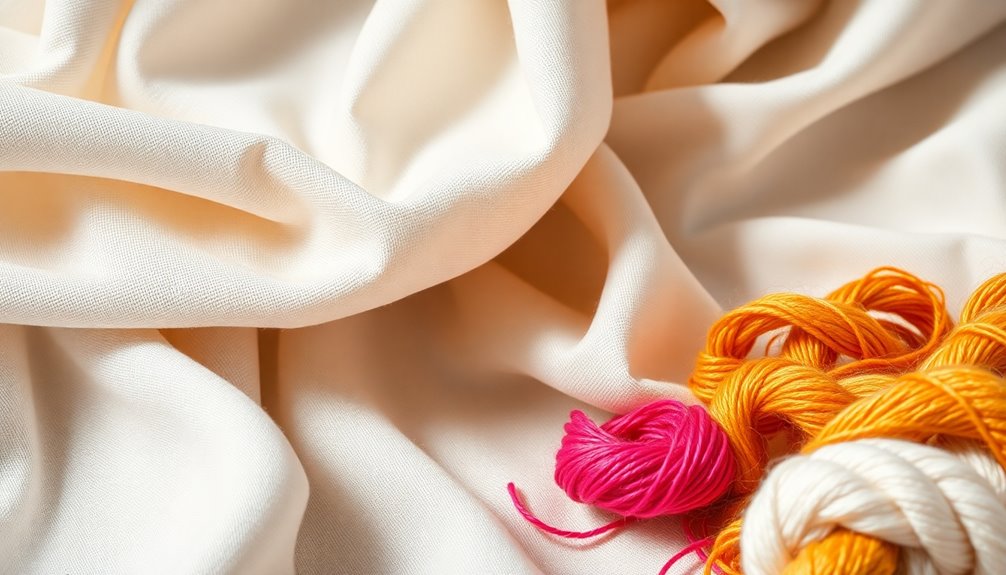
When you explore the world of mercerized cotton products, you'll discover a diverse range that caters to various needs and preferences.
You'll find 100-percent mercerized cotton yarns and cotton-wrapped polyester-core threads, both enhancing strength and versatility. Products like Rico Essentials Cotton DK and Drops Muscat are popular, celebrated for their vibrant colors and reduced shrinkage, making them ideal for various textile applications.
Additionally, fabrics woven from mercerized yarns may undergo a double-mercerization process, resulting in extra sheen and durability. DMC embroidery flosses are often double-mercerized, providing the smoothness and sheen necessary for intricate embroidery work.
When shopping, look for "mercerized" on labels to guarantee you're getting the quality and texture you desire.
Comparing Mercerized Cotton to Regular Cotton
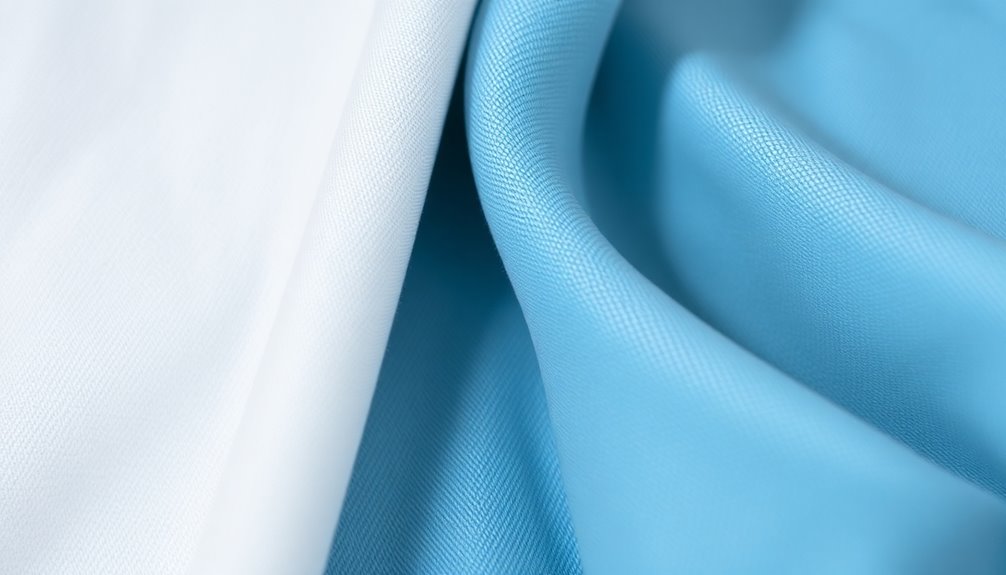
When you compare mercerized cotton to regular cotton, you'll notice significant differences in luster and shine.
Mercerized cotton's enhanced durability and strength make it a standout choice for those seeking long-lasting fabric.
However, regular cotton still holds its charm with its natural softness and superior absorbency.
Luster and Shine Differences
Luster and shine are crucial factors that distinguish mercerized cotton from regular cotton. Mercerized cotton undergoes a sodium hydroxide treatment that transforms its fibers from flat to cylindrical, greatly enhancing its luster. This structural change improves light reflection, giving mercerized cotton its striking shiny appearance.
When you compare cotton yarns made from mercerized cotton to those from untreated cotton, you'll notice that the former absorbs dye more effectively, resulting in richer, more vibrant colors. Regular cotton often appears dull and can fade faster.
Additionally, mercerized cotton features a smoother texture, enhancing both its visual appeal and tactile experience. Best of all, the enhanced luster of mercerized cotton endures through multiple washes, unlike regular cotton, which tends to lose its shine.
Durability and Strength Comparison
Although both mercerized and regular cotton have their merits, mercerized cotton stands out in terms of durability and strength. Thanks to the mercerization process, mercerized cotton boasts increased tensile strength, making it approximately 20-25% stronger than regular cotton.
This enhanced strength translates to better durability, allowing the fabric to withstand wear and tear, making it ideal for high-use items like clothing and home textiles. Additionally, mercerized cotton maintains its shape better after washing, reducing shrinkage while keeping colors vibrant and resistant to fading.
In contrast, regular cotton tends to shrink, fade, and produce more lint over time. Choosing mercerized cotton means investing in a fabric that looks great and lasts longer, enhancing your wardrobe and home.
Caring for Mercerized Cotton Fabrics
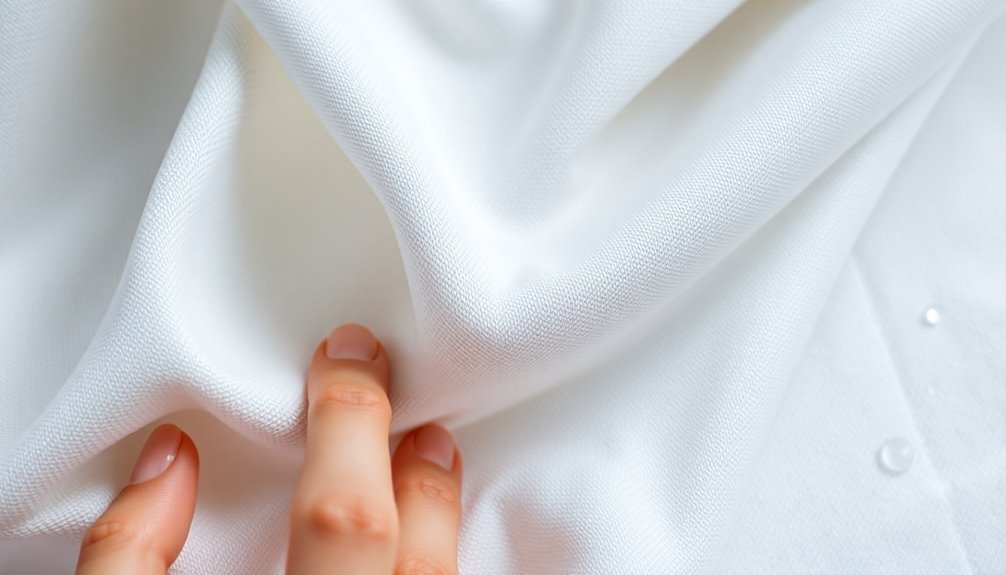
Caring for mercerized cotton fabrics is straightforward, thanks to their durability and ease of maintenance.
You can machine wash mercerized cotton, but it's best to use cold or lukewarm water to keep those vibrant colors intact and prevent shrinkage. Avoid bleach and harsh detergents, as these can damage the fibers and dull the fabric's luster.
For drying, air-drying is recommended, but if you prefer a dryer, use low heat to maintain the fabric's shape and quality.
When it comes to ironing, you can restore the smoothness of mercerized cotton, but make sure to use a medium setting and iron on the reverse side to protect the shiny surface.
With these simple care tips, your mercerized cotton will last beautifully.
Applications of Mercerized Cotton in Fashion
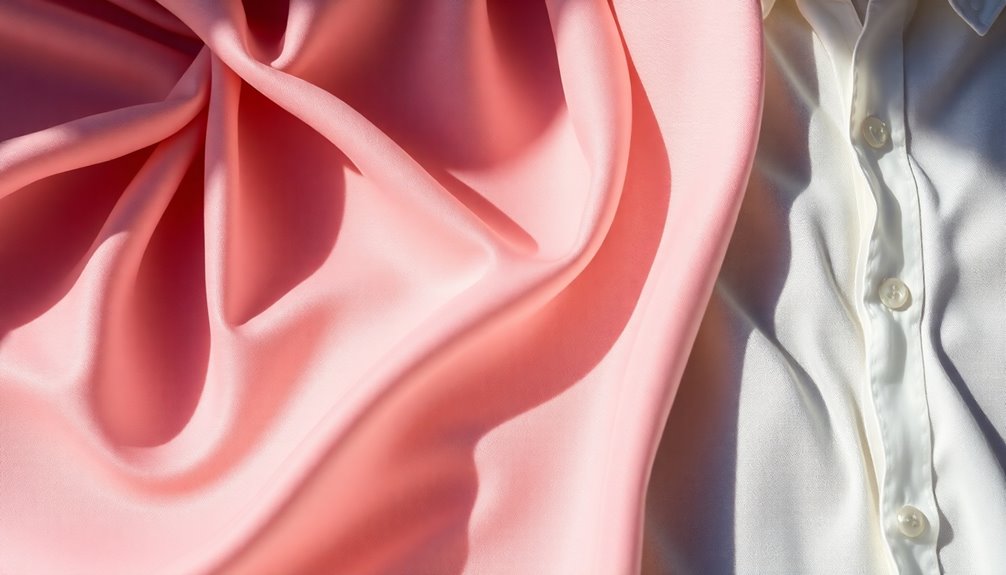
Many fashion designers are turning to mercerized cotton for its striking appearance and durability. With its enhanced luster and vibrant color retention, this fabric is perfect for high-quality garments and accessories.
You'll find mercerized cotton in tailored shirts and summer dresses, thanks to its improved tensile strength that guarantees durable clothing items can withstand wear and tear. Its smooth texture and reduced shrinkage make it a go-to choice for intricate designs, including knitwear and crochet projects.
Plus, the fabric's absorbency means your garments will maintain their brightness even after multiple washes. If you're seeking premium clothing options, mercerized cotton's luxurious feel makes it a popular choice in upscale fashion markets.
Environmental Considerations of Mercerization
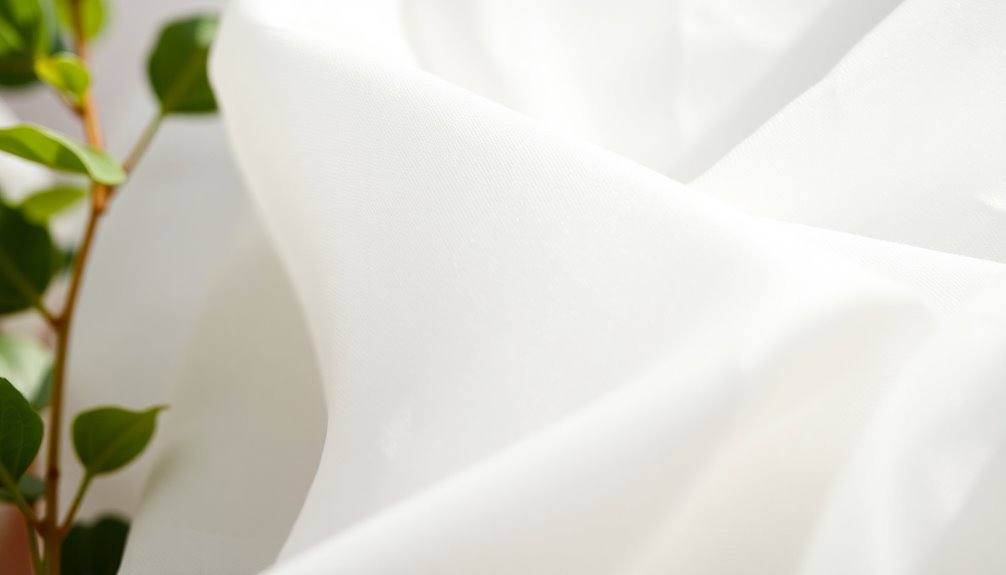
While mercerized cotton offers numerous benefits in fashion, it's important to contemplate the environmental implications of its production process.
The mercerization process uses sodium hydroxide (NaOH), which can be toxic to wildlife if released untreated into waterways. Additionally, wastewater from mercerization often exceeds federal salt concentration guidelines, raising significant environmental concerns.
Effective chemical management and treatment methods are essential to mitigate these impacts. Fortunately, the industry is exploring alternative methods, like electrochemical cell treatment, to reduce reliance on NaOH, promoting more sustainable practices.
As awareness of the textile industry's environmental footprint grows, there's an increasing demand for eco-friendly and sustainable yarn options. This shift can lead to a brighter future for both fashion and the planet.
Tips for Choosing Mercerized Cotton Yarn
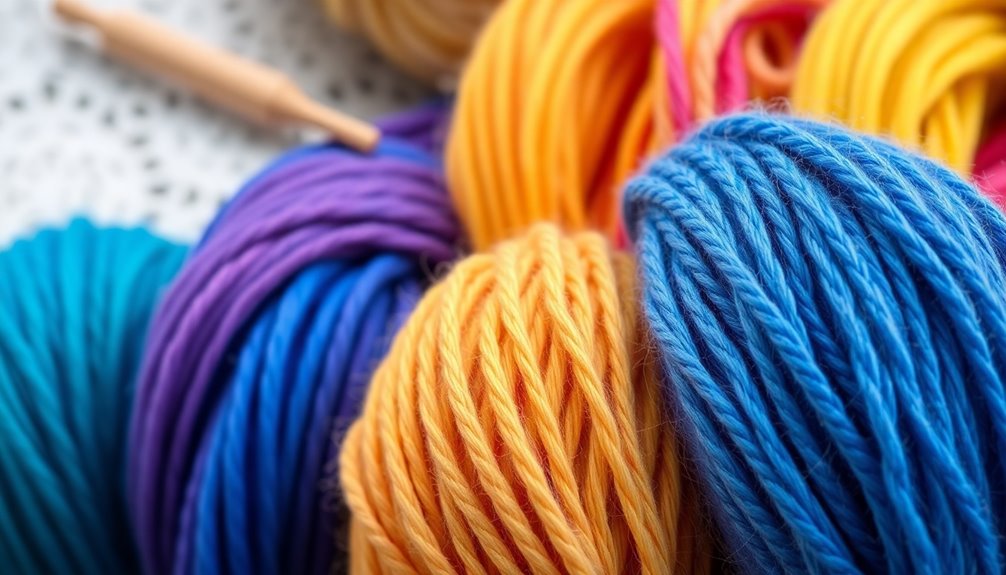
Choosing the right mercerized cotton yarn can greatly enhance your crafting experience. First, look for labels that specifically state "mercerized" to guarantee you get the desired luster and durability.
Consider the weight of the cotton yarn, as options like DK, sport, and worsted can affect your project's final look and drape. Pay close attention to fiber content; 100% mercerized cotton offers unmatched shine and strength, while blends can add elasticity.
Feel the texture before purchasing—high-quality mercerized cotton should be smooth and silky, not crunchy.
Finally, check for colorfastness to guarantee your yarn retains its vibrant colors and can withstand higher washing temperatures, making it perfect for a variety of projects.
Frequently Asked Questions
What Is the Difference Between Mercerized Cotton and Regular Cotton?
The difference between mercerized cotton and regular cotton lies in the treatment process.
Mercerized cotton's fibers swell, giving it a smoother, silkier texture and enhancing its luster. You'll notice it absorbs dye better, resulting in more vibrant colors that last longer. Additionally, mercerized cotton is stronger and less prone to breakage, while also reducing shrinkage after washing.
In contrast, regular cotton tends to retain more softness but may not maintain its shape or color as well.
What Is Mercerized Cotton Fabric?
So, you think all cotton's the same? Think again!
Mercerized cotton fabric's a game-changer. It undergoes a special treatment that makes those cotton fibers swell, resulting in stronger, shinier, and more vibrant material.
You'll love how it absorbs dye better, giving you colors that pop and resist fading. Plus, it's smoother and more durable, making it perfect for everything from stylish clothes to chic home textiles.
Say goodbye to plain old cotton!
What Are the Disadvantages of Mercerized Cotton?
Mercerized cotton has a few disadvantages you should consider.
It can feel less soft and more abrasive, which might lead to discomfort. While it's durable, it's also prone to pilling in high-friction areas.
Additionally, the fabric's reduced breathability can make it uncomfortable in hot weather.
Finally, its shiny finish may not suit casual wear, limiting its versatility in your wardrobe.
Keep these factors in mind when choosing your fabrics.
Is Mercerized Cotton Expensive?
Yes, mercerized cotton can be more expensive than regular cotton due to its special treatment process.
You might find prices ranging from about £1.60 for basic options to £8.00 for premium brands like Peruvian Pima Cotton.
While you're paying more upfront, keep in mind that the enhanced durability and vibrant colors can make it a worthwhile investment, leading to longer-lasting fabrics that save you money in the long run.
Conclusion
Now that you know about mercerized cotton, it's hard to overlook its benefits in your wardrobe or crafting projects. Imagine wearing that soft, lustrous fabric that resists fading and feels luxurious against your skin. You might even find yourself reaching for mercerized cotton yarn for your next knitting project without realizing how much of a game-changer it is. Embrace this fabric upgrade, and you'll discover a whole new level of comfort and style you didn't know you needed!


